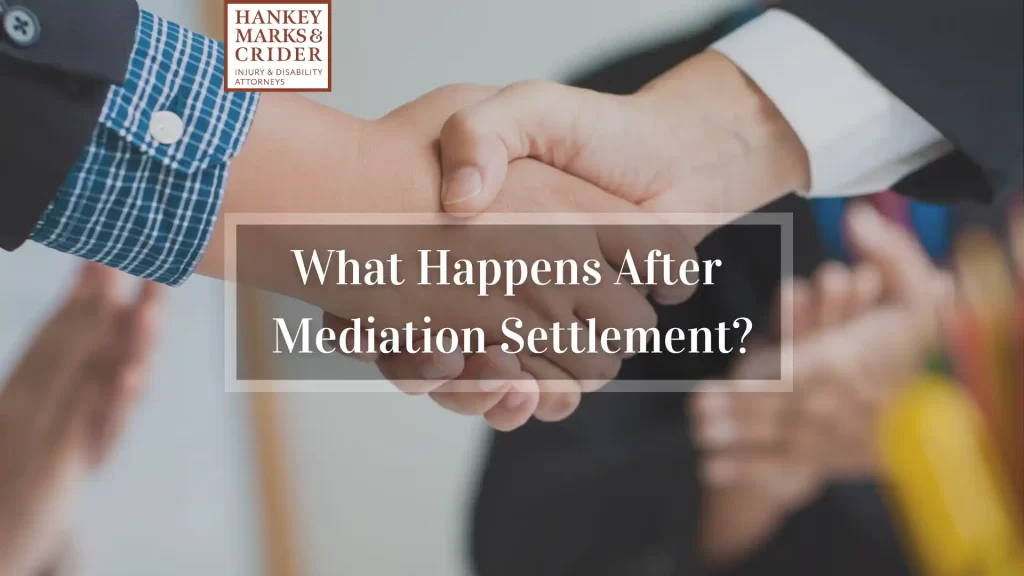
A successful mediation gives you hope for the future. You’re ready to deposit your settlement check and put this traumatic experience behind you. However, signing a settlement agreement doesn’t mean you’ll walk out of mediation with your money.
Understanding how settlements work after mediation is crucial. Several things must happen before your lawyer gives you your settlement check.
How Does Mediation End?
Mediation can lead to one of three possible results, such as:
- The parties settle
- The parties don’t settle
- Negotiations continue after mediation
The mediator will write a settlement agreement after the parties have mutually resolved all the issues. All parties involved in the lawsuit must sign the written contract. If you attended court-ordered mediation, you must file the agreement with the court.
Your settlement becomes legally binding once the judge presiding over the case signs off on the agreement. Going back with another settlement proposal or changing the terms of the arrangement isn’t possible after that.
Understanding what a signed mediation agreement means is critical. It’s final and enforceable under state law. During negotiations, you must seek compensation that will cover your total losses. If you require future medical care, your settlement should pay those expenses so you don’t have to pay out of pocket.
Elements of a Signed Settlement Agreement
The terms of your settlement agreement will depend on numerous factors and the unique aspects of your case. The typical settlement agreement includes provisions such as:
- The plaintiff agrees not to pursue additional legal action against the defendant for the same case.
- The defendant agrees to the settlement.
- The plaintiff won’t file other claims related to the accident or injury in the future.
What Happens If Someone Violates the Settlement Terms?
Court-ordered mediation resulting in a settlement agreement is legally enforceable. A judge can force either party to the contract to comply with the terms if they try to avoid their legal obligations. The judge can also impose sanctions on the party who doesn’t fulfill the responsibilities outlined in the contract, such as:
- Paying attorneys’ fees
- Paying court costs
- Covering mediation expenses
How Long After Mediation Will I Get My Money?
You can expect to receive your settlement check four to six weeks after signing the agreement. However, it might take longer to receive your check if the case is complex.
The insurance company will mail your check to your personal injury attorney. Your attorney will deposit it in a trust or escrow account until it’s ready for disbursement.
You likely won’t receive a check for the full settlement amount. Your attorney must pay your medical bills, legal fees, and other case-related expenses. After settling unpaid balances with settlement proceeds, they will print a check for the amount left in the account.
Can I Schedule Another Mediation If the First One Fails?
 Yes. Sometimes, opposing parties don’t settle the case on the first try. Multiple mediation sessions might be necessary to resolve the issues and reach mutually beneficial terms.
Yes. Sometimes, opposing parties don’t settle the case on the first try. Multiple mediation sessions might be necessary to resolve the issues and reach mutually beneficial terms.
You can request another mediation if you and the defendant are willing to try again. The next meeting date will depend on various circumstances, including:
- High settlement proposal – You might propose a significant settlement to cover your severe injuries, expensive medical bills, and other losses. However, getting the insurance company to schedule another mediation can take some time. When a plaintiff asks for a lot of money, the insurer must investigate and gather evidence to determine whether the number is justified.
- Expert testimony – The insurer might want a medical provider to provide testimony about your injuries before attending another mediation. The doctor will explain the type and extent of your injuries and related symptoms. They will also describe the physical or mental limitations the injuries cause, including whether you can work, perform routine tasks, or live independently. Scheduling a date to obtain the testimony might take a while. That can extend the timeframe until the next mediation session occurs.
Protect Your Rights with an Experienced Personal Injury Attorney
Mediation can seem like a never-ending process filled with stress and frustration. You can finally breathe a sigh of relief when you settle your case. The next steps are essential to ensure the signed agreement includes fair terms and that the defendant complies with them.
Hankey Marks & Crider will help you prepare for mediation and negotiate an appropriate settlement. Our Indianapolis personal injury lawyers have over 80 years of combined experience advocating for those injured by the actions of others.
If you sustained injuries in an accident that someone else caused, do not hesitate to call Hankey Marks & Crider at (317) 634-8565 for a free consultation.
Related posts
What Should You Not Say During Mediation?
What are Settlement Loans and Should you Take One Out on Your Pending Lawsuit?

